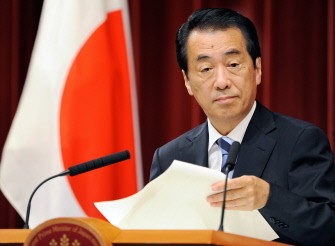TOKYO, Aug 10, 2010 (AFP) - Japan's government on Tuesday issued a fresh apology for the country's past colonial rule of the Korean peninsula, ahead of the August 29 centenary of the annexation as Tokyo eyes stronger Seoul ties.
In a statement, Prime Minister Naoto Kan expressed deep regret over what he referred to as the "suffering" inflicted during Japan's colonial rule from 1910 to 1945.

The apology, approved by Kan's centre-left Democratic Party of Japan (DPJ) at a cabinet meeting Tuesday, was timed also to precede South Korea's celebration of its 1945 liberation on August 15.
In a statement, Kan expressed his "feelings of deep remorse and heartfelt apology for the tremendous damage and suffering brought by the colonial rule".
Kan said: "Through the colonial rule that was against their will... the people of Korea were deprived of their nation and culture and their ethnic pride was deeply hurt."
He added that Japan would "in the near future" hand over precious cultural artifacts originating from the peninsula that South Korea has been demanding, including some royal records of the Chosun Dynasty (1392-1910).
The premier held a telephone conversation with South Korean President Lee Myung-Bak after the release of a statement to which South Korea gave a guarded welcome, saying it hoped the apology would herald closer ties between the two.
"We expect all Japanese people to share this view," South Korean foreign ministry spokesman Kim Young-Sun said.
"We recognise prime minister Kan's statement as his and the Japanese government's volition to overcome the unfortunate past between Korea and Japan and to develop a bright future in their relations," he added.
Kan said on Tuesday that he sought to "build a future-oriented relationship" with South Korea. Tokyo is looking to strengthen cooperation in addressing the North's nuclear ambitions and abductions of foreign nationals.
"While I hope that the ties between Japan and South Korea will become deeper and stronger... I express my determination not to spare any efforts to open the future of the two countries," said Kan.
Japanese prime ministers in recent decades have expressed regret for the country's wartime aggression in Asia, including a landmark 1995 statement from then prime minister Tomiichi Murayama.
But such sentiments have been dismissed as insincere by Asian neighbours, partly because of comments made by some conservative lawmakers who refuse to admit to Japan's past aggression.
Some Japanese lawmakers have argued that such statements set a precedent for Japan to continue a "diplomacy of apology". One DPJ member, Jin Matsubara, lashed out against Tuesday's move as "extremely disgraceful".
But Masao Okonogi, professor of Korean studies at Keio University, welcomed the statement.
"This is Japan's first official recognition that the colonial rule was against (specifically) Korean people's will and that it deprived them of their country."
At a press conference later Tuesday, Kan reiterated that he would not make a controversial visit to the Yasukuni Shrine on the August 15 anniversary of Japan's 1945 surrender, in honour of its war dead.
The shrine in Tokyo honours Japan's 2.5 million World War II dead, including 14 top war criminals, and visits there by past Japanese premiers angered Chinese and Korean leaders.
Kan added that issues of reparation for individuals and their right to demand state compensation were "fully settled" when the two countries normalised ties in 1965.
Japan colonised Korea from 1910, signing an annexation treaty on August 22 which took effect on August 29 that year.
The annexation ended on August 15, 1945, when Japan surrendered to the US-led allies in World War II. The Korean peninsula was then divided into a communist North and a capitalist South.
Japan and South Korea normalised relations in 1965, with Tokyo extending massive economic aid to Seoul, which agreed not to demand reparations for the colonial rule.







)
















